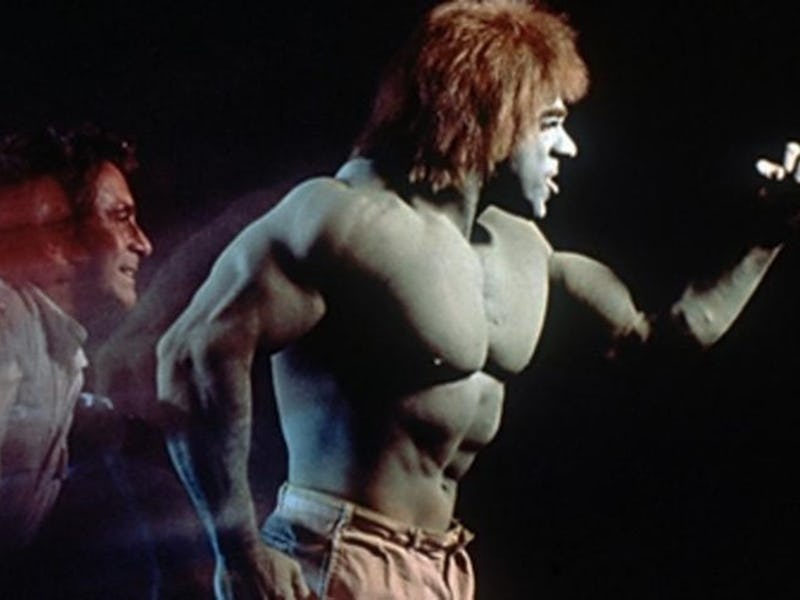An Obscure Marvel Movie Accidentally Had The Most Subversive Ending Ever
A death so final even God couldn’t retcon it.

In a world where superheroes are continually revived, reanimated, or recast, no matter how often they’ve previously been sent to that great big multiverse in the sky, it’s admirable that The Incredible Hulk’s small-screen swansong adhered to its title forevermore. That said, this permanent demise wasn’t exactly part of the plan.
Despite its spoiler-heavy name, The Death of the Incredible Hulk wasn’t supposed to wrap up the string of TV movies that brought mild-mannered Dr. David Banner (Bruce Bixby) and his unjolly green giant alter-ego (Lou Ferrigno) back to television after six years in the wilderness. Following the success of 1988’s The Incredible Hulk Returns and 1989’s The Trial of the Incredible Hulk, NBC bosses and screenwriter Gerald Di Pego had intended to deliver a fourth feature-length helping of smashing, stomping action before circumstances intervened.
Celebrating its 35th anniversary this month, The Death of the Incredible Hulk starts as a cross between Good Will Hunting and the tone-deaf Simple Jack films so brilliantly skewered in Tropic Thunder. In a bid to access the information he believes will prevent all the metamorphosing, Banner plays dumb as a research facility janitor. While he sweeps floors during the day, he sneakily examines the formulas scientist Ronald Pratt (Philip Sterling) helpfully leaves on a chalkboard at night.
This slightly problematic cover story proves entirely unnecessary; upon learning the identity of his nocturnal assistant, Pratt and his equally kindly wife Amy (Barbara Tarbuck) agree to help Banner find a cure. Using a concoction of tranquilizers, electric rod shocks, and forcefield cages, the pair summon the Hulk to see exactly what they’re dealing with. In an unexpectedly touching scene, the experiment’s video footage allows their test subject to witness his transformation for the very first time (although even in 1990, the special effects are still limited to some ripping clothes, white contact lenses, and buckets of green paint).
Unfortunately, the new dream team is foiled by a group of racquetball-playing Soviet spies determined to get their grubby mitts on Pratt’s studies so their nation can create super-soldiers. During their rude gatecrashing, poor Pratt ends up in a coma, and the Hulk is forced to flee the facility through an electric fence. While on the run in his less aggressive state, Banner is tracked by Jasmine (Elizabeth Gracen), an agent who’s no stranger to chameleonic personas herself.
You don’t want to see Banner when he’s angry.
Luckily, Jasmine is a reluctant spy, only taking the job when cartoonish superior Kasha (Andreas Katsulas) threatens to kill her sister Bella (Anna Katarina) if she doesn’t comply. Instead of turning Banner in, she falls in love with him (as demonstrated by several icky scenes that verge on daytime soap opera). And after discovering her sibling isn’t a damsel in distress, but actually the brains of the whole operation, she joins forces with Banner to take her down.
It’s here where The Death of the Incredible Hulk finally kicks it up a gear as the loved-up pair go on the warpath. First, they pose as prospective car buyers to capture and question a henchman, then engage in a high-speed car chase to rescue the abducted Amy and recovering Pratt. Then, just in time, the Hulk re-emerges to thwart Bella’s getaway in a small plane.
The evil sister gets her comeuppance when her attempt to shoot the heroic monster hits the fuel tank instead, triggering an explosion that kills everyone inside. Tragically, that also includes the Hulk, who falls hundreds of feet in glorious slow-motion (and to the sounds of a cheesy power ballad, too) before hitting the concrete airfield below.
The Hulk at his World’s Strongest Man best.
With his injuries too severe for even his miraculous healing powers, The Hulk turns back into a dying Banner in front of his new beau. “David, don’t. Don’t die. We can be free now,” Jasmine pleads. “Jasmine... I am free,” comes his tear-jerking response.
Although the end credits roll soon after, those weren’t meant to be his final words. According to Di Pego, a follow-up called The Revenge of the Incredible Hulk would’ve somehow brought the doctor back to life. Lacking his superpowers, he would have been kidnapped by some pesky villains — no doubt hailing from Eastern Europe — who force him to turn their agents into an army of Hulks. The only way to save the day? Faithfully re-create the gamma radiation experiment that accidentally sparked his own transfiguration.
This tale, which was also designed to bring Iron Man and She-Hulk into the fold, never saw the light of day, as mediocre ratings for The Death of the Incredible Hulk prompted NBC to end the franchise. The tragic passing of Bixby from lung cancer in 1993, meanwhile, ended any hopes of a belated return elsewhere. It was hard to even imagine anyone else in the role until Eric Bana took up the torch more than a decade later.
So The Death of the Incredible Hulk remains a rare beast, a superhero story where the superhero is killed off for good. No retconning, no prequel appearances, and no preposterous fan service resurrections. It might not be the character’s greatest adventure, but it’s undeniably the most honest.